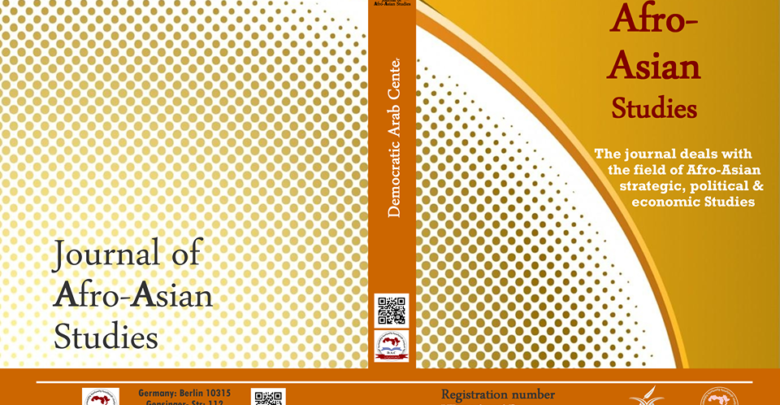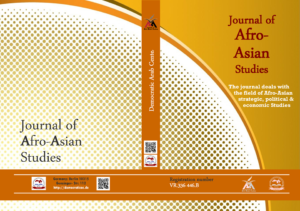Journal of Afro-Asian Studies

Journal of Afro-Asian Studies
A Periodical International Journal published by the #Democratic_Arabic_Center Germany – Berlin. The journal deals with the field of Afro-Asian strategic, political and economic studies
- Journal of Afro – Asian Studies First issue – April 2019
- Journal of Afro-Asian Studies Second Issue – July 2019
- Journal of Afro-Asian Studies Third Issue – October 2019
- Journal of Afro-Asian Studies Fourth Issue – January 2020
- Journal of Afro-Asian Studies Fifth Issue – April 2020
- Journal of Afro-Asian Studies Sixth issue – July 2020
- Journal of Afro-Asian Studies Seventh Issue – November 2020
- Journal of Afro-Asian Studies – Eight issue February 2021
- Journal of Afro-Asian Studies – Ninth Issue – May 2021
- Journal of Afro-Asian Studies Tenth Issue – August 2021
- Journal of Afro-Asian Studies Eleventh Issue – November 2021
- Journal of Afro-Asian Studies Twelfth Issue – February 2022
- Journal of Afro-Asian Studies Thirteenth Issue – May 2022
- Journal of Afro-Asian Studies Fourteenth Issue – August 2022
- Journal of Afro-Asian Studies Fifteenth Issue – November 2022
- Journal of Afro-Asian Studies Sixteenth Issue – February 2023
- Journal of Afro-Asian Studies Seventeenth Issue – May 2023
- Journal of Afro-Asian Studies Eighteenth Issue – August 2023
- Journal of Afro-Asian Studies Nineteenth Issue – November 2023
- Journal of Afro-Asian Studies Twentieth Issue – February 2024
- Journal of Afro-Asian Studies Twenty-First Issue – May 2024
- Journal of Afro-Asian Studies Twenty-two Issue – August 2024
- Journal of Afro-Asian Studies Twenty-Third Issue – November 2024
- Journal of Afro-Asian Studies Twenty-fourth Issue – February 2025
- Journal of Afro-Asian Studies Twenty-fifth Issue – May 2025
- Journal of Afro-Asian Studies Twenty-sixth Issue – August 2025
- Journal of Afro-Asian Studies Twenty-seventh Issue – November 2025
A Periodical International Journal published by the #Democratic_Arabic_Center Germany – Berlin. The journal deals with the field of Afro-Asian strategic, political and economic studies
Nationales ISSN-Zentrum für Deutschland
ISSN 2628-6475
Journal of Afro-Asian Studies

- Editor- in- Chief : Dr. Latreche Ali – Lecturer at the University of Abou Bekr Belkaid Tlemcen – Algeria
- Executif Editor- in- Chief : Dr. Mohammed Assioui – Faculty of letters and Humanities, University Mohamed 1st, Oujda- Morocco
President of the Scientific Committee : Salah Mohamed Ibrahim Ahmed – Professor of Economics, Sudan
Scientific Committee Members
- Dr. Abdelfatah Abdelaziz Mohamed Ibrahim. Alzaiem Alazhari University. Sudan
- Dr. Mustafa khalifa Ibrahim
- Dr. Buthaina Hassani. Faculty of Letters and Humanities, Mohamed 1st University. Morocco
- Dr. Maytham manfy kadhum. Imam Al-Kadhim University. Iraq
- Dr. Haider Adhab Hussein. University of Babylon. Iraq
- Dr. Marwa abd uljaleel alswedy. Technical College of Management. Middel technical University. Iraq
- Dr. Salma Talal Abdul Hamid Al-Badri. College of Law. Al-Nahrain University. Iraq
- Dr. Dema Faiq Abu Latifa. Faculty of Law. Al-Istiqlal University. Palestine
- Dr. Tayri Abdelkader. . Faculty of Letters and Humanities, Mohamed 1st University. Morocco
- Dr. Benyounes Benaicha. . Faculty of Letters and Humanities, Mohamed 1st University. Morocco
- Dr. Youssef Balet. Multidisciplinary Faculty of Nador, Mohamed 1st University. Morocco
- Dr. Mohammed ASSIOUI. . Faculty of Letters and Humanities, Mohamed 1st University. Morocco
- Lina Ghali American University of Science and Technology AUST
- George Wah Williams -University, Minneapolis, Minnesota, United State
- Fayrouz Fawzy -University of Quebec – Montreal – Canada
- Ammar Mustafa Alzein Counselor at UN in Geneva, Switzerland
- Samar Saad-OMNES University – HEIP – Paris- France
- Mary Louis – School of International Business – Scandinavia – Denmark
- Munsif Al –Lawati – Manouba University – Tunisia
- Safaa Arsali (University of Tunis) and member of SLAM Laboratory -Evry University. France
- Ahmed Makharish – South Mississippi University – United States
- Shlash N. Alzyoud. University of Southern Mississippi- USA
- Ali Ahmed zain Alsagaf Jaipur University, India
- Researcher -College of Education – North Central University – USA
- Samira Setoutah – Sharjah University.Emirats arabes unis
- Al-Sayed Al-Saeed Abdul-Wahhab – Menoufia University. Egypt
- Saddam Suleiman Middle East University, Jordan
- Samar Fanos Abdulnor -SMU University. Texas, United State- USA
- Nuha Qatawneh – Manouba University- Kingdom of Jordan
- Ziad Latouf -member of the Institute of Geopolitical Studies applied in Paris – France
- Sam Zahy PHD -Dedman School of Law Southern Methodist University, Texas. USA
- Naif Sultan Al Shareef -Abdulaziz University – Kingdom of Saudi Arabia
- Emad Mohamed Fawzy Hussein- Alexandria University. . Egypt
- Jihane Hussein Fakih -Lebanese University – Lebanon
- Patricia Al-Azzi – Lebanese University- Lebanon
- Tarteel darwish -Beirut Arab University. – Lebanon
- Hala Abu Hamdan -Lebanese University. – Lebanon
- Hanan Mohamed -University of Bahrain
- EMAD HEFNAWY, Ain Shams University – Egypt
- Dr . Randa Abd el Raouf Kamal Ali – Benha University
- Rania Taysir Adada – Lebanese University- Lebanon
- Zeina Mohamed Ahmed- University of Dubai – United Arab Emirates
- Dolly Kamal Al Sarraf – Lebanese University. – Lebanon
- Sabrine ALJelassi Assistant – Sousse University – Tunisia
- Mays Abdel Karim Ismail -Damascus University – Syrian Arab Republic
- Dr . Desiree George Al-Azzi -Lebanese University- Lebanon
- Jacqueline Ayoub -Lebanese University- Lebanon
- Nour el houda badis. Faculte des sciences humaines et sociales de tunis
- Mayssa Abbas HAJJ SLEIMAN- Lebanese University- Lebanon
- Munther Mubder Abdul -Karim alabassi- Diyala University –Iraq
- Maher Mubder Abdul Karim Al-Abbasi .-University of Diyala – Republic of Iraq
- HEYAM Musa Mustafa AL –TAJ – Amman Arab University – Kingdom of Jordan
- Katia Tannous Eliane Lebanese University- Lebanon
- Natalie Hanna Raphael -Lebanese University- Lebanon
- Sekkal BabouMariam -Saida University, Algeria
- Roba Fawzi Nasr -Lebanese University and Antonine University_ Lebanon
- Motaz Khorshid -Cairo University- Egypt
- Mohamed ElAzaab Faculty of Engineering – Cairo University – Egypt
- Saadi Mohamed Relizane University, Algeria
- Ahmed Abdel Moneim University of Khartoum, Sudan
- Benaicha Amine University of Algiers III, Algeria
- Nadine Kahil Beirut Arab University, Lebanon
- Ahmed Manea Hoshan Basrah University, Iraq
- Filali Férial University of Algiers II, Algeria
- Ahmed Mohamed Lemine El Mokhtar Nouakchott University, Mauritania
- Ouarniki Ouafa Oran II University, Algeria
- Dr Samar Hassan El Bagori Cairo University, Egypt
- Hamdani Yamina Tlemcen University, Algeria
- Abdullahi Yunusa Husaini Sule Lamido University, Nigeria
- Kelkoula Nachoua l’université de Setif, Algeria
- a. Asmaa Mohamed Abdel-Qader Sandouqa- Manouba University – Tunisia
- a.Aouatef Mekdiche – Manouba University – Tunisia
- Doaa Al-Hawari – Alexandria University, Egypt
Publishing Rules
- Research paper should be written in English as it is necessary to consider the clarity and integrity of the text and avoid grammatical, spelling and linguistic errors
- Journal of Afro-Asian A Periodical International Journal published by the “Arab Democratic Center” Germany – Berlin accepts papers which deals with Afro-Asian strategic, political and economic studies only
- The research paper should not include less than 4000 words and should not exceed 8000 words
- The research paper and studied topics should be characterized by objectivity, novelty and scientific accuracy, as they should not be taken from a previous study, article, or graduation document or book
- Papers should not be published previously or subsequently in any form
- The researchers have to adopt the scientific standards recognized in the preparation of research and studies, and references should appear at the end of each page not at the end of the article and marginalization as follows
- For Books: Full Name of Author, Book’s Title, Volume/issue, Place of Publication: Publishing House, Edition, Publishing Year, Page
- For articles: full name of the author, “title of the article”, journal title, place of publication, issue, date of publication, page
- For web sites: full name of author, “title of article”, article link, date of publication, date of access to the site
- The researcher should send a brief biography with the article
Research Paper should be sent in the form of a Microsoft word to the following email
afro-asian@democraticac.de
- The researcher should sign a pledge that the article has not been published in any form hard copy or electronically, and not be submitted for publication to any other party (the pledge form will be sent by the editor to the researcher by the e-mail of the journal)
- The researcher will be informed of the initial acceptance of the research or rejection
- The journal selects arbitrators to read and review confidentially the articles and researches received in the journal. The arbitration remarks will be sent to the researcher. If the article is accepted for publication but needs some modifications, thus the writer should make the required modifications within ten days of being notified of the decision of the committee
- The received articles will not be returned back to their authors either published or not
- The journal may make some necessary modifications to the material submitted for publication without changing its contents
- The materials published in the journal reflect the views of the authors and do not necessarily represent the opinion of the journal
- Any breach of the rules of the scientific research will be borne by the author of the article
- Any research or article that does not meet the conditions will not be taken into consideration and will not be published regardless of its scientific value
- The articles sent to the Journal of Afro-Asian Studies require the following specifications
- Page margins should be as follows: Top 02, Bottom 02, Right 02, Left 02, Header Sheet 5, Bottom Sheet 1.5
- Title of the article: font: Times New Roman, Size: 16
- Full name of researcher: (font style: Times New Roman ont size: 13)
- Degree of researcher (font style: Times New Roman size: 13)
- Foundation of full affiliation and country (font style: Times New Roman size: 13)
- E-mail of the researcher (font style: Times New Roman font size: 12)
- Abstract: The abstract should not exceed 200 words and not less than 150 words (Font: Times New Roman size: 13, italics)
- Key words: (Between 05 and 08 words, Font: Times New Roman, Size: 13, Italics)
- The Introduction should include the following components: Introducing the topic, research questions, hypothesis or hypotheses, the importance of the study, the objectives of the study, the literature of the study (previous studies), the study curricula, the study axes. (Font style: Times New Roman size: 13 between lines: 1.5)
- For content: (font style: Times New Roman size: 13, between lines: 1.5)
- Principal Headline 1: (font style: Times New Roman size: 16, between lines: 1.5)
- First subtitle: (font style: Times New Roman size: 14, between lines: 1.5)
- Second subtitle: (font style: Times New Roman size: 14, between lines: 1.5)
- Principal Headline 2: (font style: Times New Roman size: 16, between lines: 1.5)
- First subtitle: (font style: Times New Roman size: 14, between lines: 1.5)
- Second subtitle: (font style: Times New Roman size: 14, between lines: 1.5)
- Conclusion: findings and recommendations: (font style: Times New Roman size: 13, between lines: 1.5)
- List of sources and references: (font style: Times New Roman size: 13, between lines: 1.5)
- For Times New Roman size: marginalization and referrals: at the end of pages and not in the latest article, font style size: 12, between lines: 1.0
Democratic Arabic Center in Berlin – Germany
